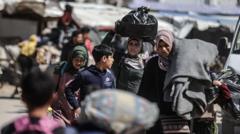In a recent statement, the head of the International Committee of the Red Cross, Mirjana Spoljaric, characterized Gaza as "hell on earth" due to Israel's aggressive military actions which have resulted in over 1,500 fatalities and the displacement of nearly 400,000 residents. The ongoing conflict raises serious concerns about the violation of international laws protecting civilians in war zones.
Red Cross Chief Declares Gaza a "Hell on Earth" Amid Ongoing Assault

Red Cross Chief Declares Gaza a "Hell on Earth" Amid Ongoing Assault
The International Committee of the Red Cross issues a grave warning as the humanitarian crisis escalates in Gaza, with countless lives lost and widespread displacement following Israel's military operations.
In an alarming declaration to the BBC, Mirjana Spoljaric, the president of the International Committee of the Red Cross (ICRC), described the situation in Gaza as "hell on earth," highlighting the dire humanitarian crisis stemming from Israel's relentless military assault. Her remarks coincide with reports from the UN human rights office that Israel's tactics pose a grave threat to the survival of the Palestinian population in the enclave.
Since resuming its military operations in March, Israel's bombardment has led to at least 1,542 casualties, according to the Hamas-run health ministry in Gaza, with around 400,000 people displaced due to evacuation orders. For months now, a complete blockade on food supplies, medical assistance, and other goods has been in effect, compounding the already severe humanitarian conditions.
The ICRC, a custodian of international humanitarian law, typically engages in confidential dialogues during violent conflicts; however, Spoljaric's public statements reflect a critical stance against what she deems an "extreme hollowing out" of these laws. Israel asserts that its military actions comply with international standards, claiming that Hamas's integration among civilians leads to unavoidable collateral damage.
Despite these claims, the UN has expressed serious concerns regarding the Israeli Defense Forces (IDF) operations, noting that civilians are disproportionately suffering from the ongoing assault. Reports from the UN human rights office made clear that the conditions under which Palestinians are living in Gaza are steadily becoming unlivable.
The Geneva Conventions, which protect civilians and enforce humane treatment of those in combat, remain a pivotal point of contention. Spoljaric emphasized that no entity is exempt from adhering to the international laws that prevent war crimes and genocidal acts. She acknowledged the critical plight of civilians, who are allegedly experiencing repeated displacements and devastating bombing of their shelters.
In her call for a ceasefire, she cited past instances where temporary pauses had enabled the ICRC to successfully reestablish familial ties for hostages taken during the conflict. Yet she also warned of a troubling trend toward "dehumanization," where the suffering in Gaza is increasingly overlooked, despite evidence of war crimes.
Reflecting on the implications of the ongoing violence, Spoljaric expressed that the repercussions of the suffering experienced by the people of Gaza would resonate for generations. The current campaign, launched by Israel in response to a surprising escalatory attack on 7 October 2023 that cost around 1,200 lives and brought more than 250 hostages, continues to fuel growing destruction.
As the humanitarian crisis deepens in Gaza, the ICRC and other humanitarian organizations are calling for immediate attention and action to uphold both international law and the lives of those caught in the crossfire.
Since resuming its military operations in March, Israel's bombardment has led to at least 1,542 casualties, according to the Hamas-run health ministry in Gaza, with around 400,000 people displaced due to evacuation orders. For months now, a complete blockade on food supplies, medical assistance, and other goods has been in effect, compounding the already severe humanitarian conditions.
The ICRC, a custodian of international humanitarian law, typically engages in confidential dialogues during violent conflicts; however, Spoljaric's public statements reflect a critical stance against what she deems an "extreme hollowing out" of these laws. Israel asserts that its military actions comply with international standards, claiming that Hamas's integration among civilians leads to unavoidable collateral damage.
Despite these claims, the UN has expressed serious concerns regarding the Israeli Defense Forces (IDF) operations, noting that civilians are disproportionately suffering from the ongoing assault. Reports from the UN human rights office made clear that the conditions under which Palestinians are living in Gaza are steadily becoming unlivable.
The Geneva Conventions, which protect civilians and enforce humane treatment of those in combat, remain a pivotal point of contention. Spoljaric emphasized that no entity is exempt from adhering to the international laws that prevent war crimes and genocidal acts. She acknowledged the critical plight of civilians, who are allegedly experiencing repeated displacements and devastating bombing of their shelters.
In her call for a ceasefire, she cited past instances where temporary pauses had enabled the ICRC to successfully reestablish familial ties for hostages taken during the conflict. Yet she also warned of a troubling trend toward "dehumanization," where the suffering in Gaza is increasingly overlooked, despite evidence of war crimes.
Reflecting on the implications of the ongoing violence, Spoljaric expressed that the repercussions of the suffering experienced by the people of Gaza would resonate for generations. The current campaign, launched by Israel in response to a surprising escalatory attack on 7 October 2023 that cost around 1,200 lives and brought more than 250 hostages, continues to fuel growing destruction.
As the humanitarian crisis deepens in Gaza, the ICRC and other humanitarian organizations are calling for immediate attention and action to uphold both international law and the lives of those caught in the crossfire.


















